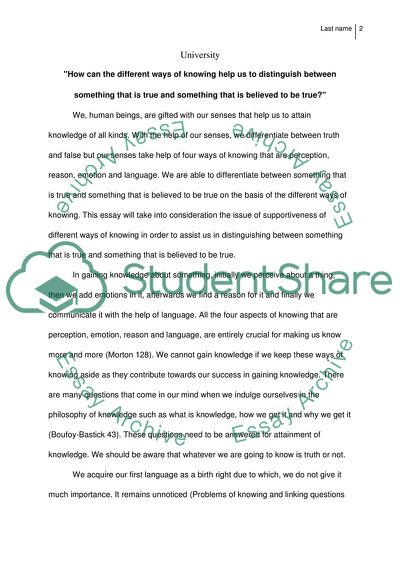Cite this document
(Ways of Knowing Help Us to Distinguish between Something that Is True Essay Example | Topics and Well Written Essays - 1250 words, n.d.)
Ways of Knowing Help Us to Distinguish between Something that Is True Essay Example | Topics and Well Written Essays - 1250 words. https://studentshare.org/humanitarian/1727560-how-can-the-different-ways-of-knowing-help-us-to-distinguish-between-something-that-is-true-and-something-that-is-believed-to-be-true
Ways of Knowing Help Us to Distinguish between Something that Is True Essay Example | Topics and Well Written Essays - 1250 words. https://studentshare.org/humanitarian/1727560-how-can-the-different-ways-of-knowing-help-us-to-distinguish-between-something-that-is-true-and-something-that-is-believed-to-be-true
(Ways of Knowing Help Us to Distinguish Between Something That Is True Essay Example | Topics and Well Written Essays - 1250 Words)
Ways of Knowing Help Us to Distinguish Between Something That Is True Essay Example | Topics and Well Written Essays - 1250 Words. https://studentshare.org/humanitarian/1727560-how-can-the-different-ways-of-knowing-help-us-to-distinguish-between-something-that-is-true-and-something-that-is-believed-to-be-true.
Ways of Knowing Help Us to Distinguish Between Something That Is True Essay Example | Topics and Well Written Essays - 1250 Words. https://studentshare.org/humanitarian/1727560-how-can-the-different-ways-of-knowing-help-us-to-distinguish-between-something-that-is-true-and-something-that-is-believed-to-be-true.
“Ways of Knowing Help Us to Distinguish Between Something That Is True Essay Example | Topics and Well Written Essays - 1250 Words”. https://studentshare.org/humanitarian/1727560-how-can-the-different-ways-of-knowing-help-us-to-distinguish-between-something-that-is-true-and-something-that-is-believed-to-be-true.


